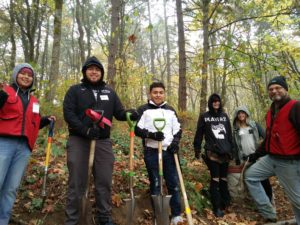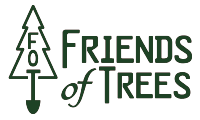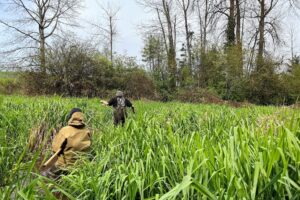Exchanging Knowledge at Chemawa
An education program for Native American students
One day this spring, Harrison found himself waist deep in water in the wetlands on the campus of the Chemawa Indian School, a Native American boarding school in Salem. Harrison, a Green Space Specialist with Friends of Trees, was there with six Chemawa students who enrolled in a class on outdoor education and habitat enhancement.
“Getting outside, away from the classroom, I got to see the students have a moment of immersion and creative discovery,” Harrison says. “They weren’t just looking for critters, they were also thinking about what that means for the environment.”
Friends of Trees has been partnering with the Chemawa Indian School for over seven years on a program designed to provide opportunities for students to build knowledge and skills that could lead to careers in the environmental field.
This year, the program had six students between 16 and 18 years old. The program includes a combination of classroom and field study. In the past, students trained as Friends of Trees Crew Leaders and participated in events, but the pandemic has made that difficult in recent years.
“The pandemic has limited field trips, so it’s been more of a stationary program on campus,” says Meng, another Green Space Specialist who works with the Chemawa students. “We’ve had to adapt and be creative, but we still have the aim to spark interest in green work.”
Luckily, there is a wetland right on campus, where students were able to test the health of a stream, plant trees and native plants to improve that health, and learn to identify plants and wildlife. They also learned how to safely use tools to improve habitat, remove invasive species, and maintain trails.
Friends of Trees provides this programming alongside Elderberry Wisdom Farm, an organization that provides opportunities for Indigenous youth to strengthen their traditional ties with the land and to build career pathways. The Chemawa program incorporates storytelling and traditional ecological knowledge (TEK), which often takes a longer view and more holistic approach to habitat restoration.
“I’ve really appreciated having the opportunity to learn about TEK from Elderberry Wisdom.” Harrison says. “We want to use our resources to empower Native organizations like them.”

The goal is to merge TEK with other career building skills, so that the students can see a possible path in the green workforce after they leave Chemawa, and have a sustained interest in issues like tree canopy, water resources, and climate change. Meng and Harrison got to see some of that spark, especially when they took the students out of the classroom and into the field.
“When I got to plant with the students, I could see that they were genuinely excited to plant,” Meng says. “They got to plan where the plants could go, and have ownership over the process.”
The program has an opportunity to grow, especially with a deepened relationship with Elderberry Wisdom Farm. In the future, we hope to once again provide crew leader training to the students and have them lead volunteers at planting events. On campus, there’s room to enhance the wetland by planting a more diverse palette of native plants and adding trails so that students can go there and feel a connection to nature, maybe without having to get waist deep in water.

